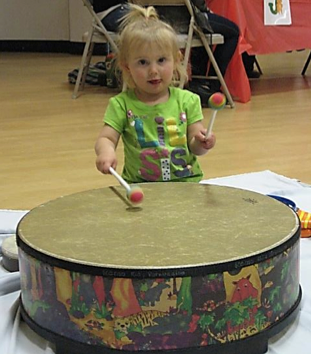(CCC&Y Reminder: Flagstaff Festival of Science Begins Sept. 23)
By Cynthia Pardo, First Things First

Photo courtesy of First Things First
Toddlers and preschoolers learn naturally by exploring and experimenting. What appears to adults as play is really forming and testing theories, and trying out different variables.
About 90% of a child’s brain development occurs before age 5, meaning the early years represent an ideal time to introduce math and science to kids.
In the U.S., students rank in the lower third among developed countries when it comes to science and math literacy, meaning our kids may not be able to compete for the jobs of the future. Economic development and educational efforts often focus on building Science, Engineering, Technology and Math (STEM) skills in the K-12 school years.
Recently, the idea of adding art into the formula is gaining popularity, going from STEM to STEAM. Activities such as painting, building blocks, baking and playing music are fun and interactive ways to build science and math skills in young kids. The arts can be used to promote innovation and creativity.
“Music, art, and dance experiences develop the kinds of thinking and learning that lead to school readiness. Once a child has the framework to learn, they can access the world around them – they are ready to observe the world around them, ask questions about how things work, and make connections between letters and sounds. These types of experiences help them develop the basic skills that lead to academic success,” said Mary Nebel, Chair of Education Committee for the Flagstaff Symphony Orchestra.
According to the Center for Early Education in STEM, simple childhood games can promote significant STEAM skills at a much earlier age. The years before kindergarten, are a critical period to help develop these skills through fun activities that get their hands and minds working.
First Things First reminds parents and caregivers that they can be ready to help their child build those early skills for STEAM. First Things First offers these activities:
- Singing and dancing convey counting concepts, and making musical instruments with everyday objects helps kids learn how to control aspects of sound like pitch, loudness, timbre and duration.
- Cooking engages children in science, math, and literacy through measuring ingredients, seeing how foods combine and change, and reading recipes.
- Building structures – knocking them down, testing them with weight, etc. – engages kids in reasoning about physics.
- Through water activities, kids experiment with movement and volume, filling cups or pails, then watching how holes in objects affect water flow.
- In playing card and board games, children use math, oral language, reading and writing; reason about strategies; and, learn to take turns, take another person’s perspective and negotiate.
Families can help kids develop critical thinking and reasoning skills by asking questions like:
- What do you think will happen?
- Why do you think it ended that way?
- How do you think things will be different if we change something?
In addition, parents can share their knowledge, early on. Things that may seem obvious to us – like weather changes, traffic patterns and the change in an egg when it’s cracked, then cooked – are fascinating new concepts for children that give them a foundation from which to build future knowledge.
By encouraging the development of STEAM skills in the early years, we help kids learn by experimenting with their environments and give them skills that will help them be successful in school and in life. In addition these STEAM building activities help to instill a love of learning and imagination.
“If a child can sing and play with purpose and express themselves with creative drama, then we are supporting that entire child – and that leads to success,” said Nebel.
So, most importantly remember to have fun and use everyday moments as learning moments.
For more great tips to support your child’s learning, visit azftf.gov.
